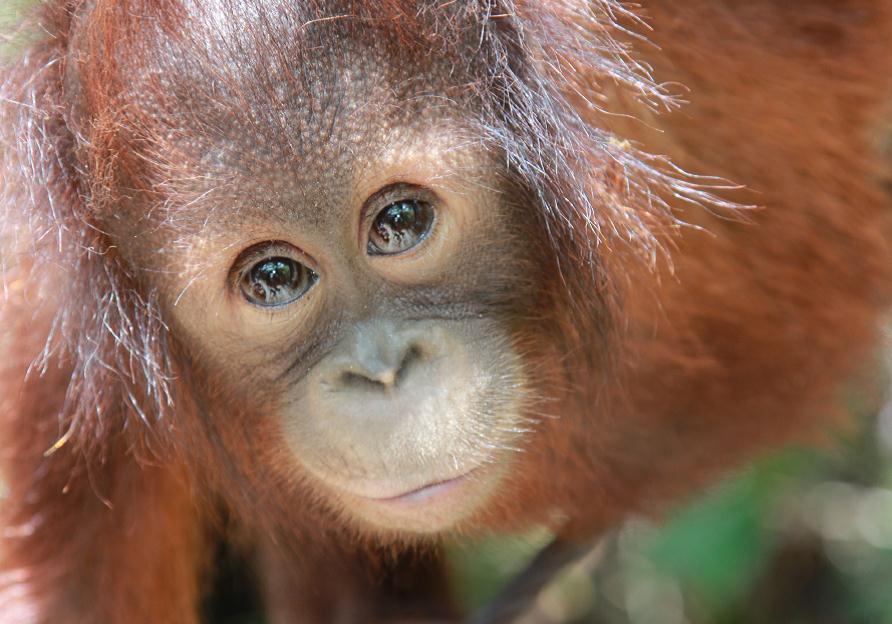Orangutans under threat
Living Now Magazine: Tony Gilding (President, BOS Australia): August 2012

Last month, the world-first release of two endangered orangutans, rehabilitated by humans, took place in a protected Indonesian reserve with help from Australian animal welfare organisation, Borneo Orangutan Survival (BOS) Australia.
The release was made possible thanks to the purchase of a 100,000 hectare piece of land, donated by Australian John Cochrane, which will hopefully become home to another 200 orangutans, currently working their way through the various stages of “Forest School”, a schooling program run by BOS that teaches orphaned, rescued orangutans the life-skills necessary to survive in the wild on their own.
While the news of the release is certainly a step in the right direction, when it comes to preserving the Indonesian rainforests and saving its resident orangutans from extinction, the reality is that this is just the beginning and much more work needs to be done if the orangutans and their habitat are to be saved form destruction.
With less than 7,000 Sumatran Orangutans and 50,000 Bornean Orangutans estimated to be living in the wild today, orangutans are considered to be an endangered species. While the Sumatran Orangutan is listed as critically endangered and the Bornean Orangutan as endangered, the greatest threat to orangutan survival is the extensive destruction of their habitat due to deforestation for logging, mining, settlements, palm oil plantations and cash crops.
Sharing 98 percent of human DNA, orangutans are highly intelligent animals with the ability to think and reason. But according to the UN’s Environmental Program (UNEP), wild orangutans are at threat of extinction within this decade if the trend in deforestation continues.
Sadly, suitable orangutan habitat in Indonesia and Malaysia has declined by more than 80 percent in the last 20 years and it is estimated that an average of 1.15 million hectares of forest per annum has been lost on Borneo between 2003 and 2007. For Sumatra, the loss is put at 550,000 hectares per annum between 1985 and 2007. The deadly combination of both legal and illegal logging and expansion of the oil palm industry is largely responsible for the destruction of the habitat.
Because oil palm is the world’s most productive oil seed, demand for the product has been growing by more than 9 percent per annum in the last decade. This is being driven by not only the food and cosmetic industry but more recently its usage as a biofuel. The combined effect of logging and oil palm expansion resulted in Indonesia having the world’s highest deforestation rate in 2006 according to a United Nations Environment Programme (UNEP) report from 2007. It concluded that up to 98 percent of the orangutan habitat in Borneo and Sumatra may be destroyed by 2022 without urgent action.
In addition to the destruction of the rainforests, tragically, adult orangutans are also shot or clubbed to death by poachers trading in baby orangutans for the illicit pet trade or the entertainment industry. While organisations such as the Borneo Orangutan Survival Foundation and the Indonesian Ministry of Forestry tirelessly work to rescue and rehabilitate orangutans to return to the protected wild, pressure comes from the fact that orangutans have a comparatively slow reproduction rate. A female orangutan will not reach sexual maturity until she is about fourteen to sixteen years of age and will only bear offspring once every eight to ten years. Reproduction is also affected by the abundance of food. When food supplies dwindle so too does the orangutan’s reproduction rate.
On a more positive note, over the years, BOS has assisted in the purchase of thousands of acres of land in Borneo that have become permanent nature reserves, helped to rescue more than 1000 orangutans and educated and provided livelihoods for thousands of local people who assist with the cause.
Following the success of the world-first re-release of the first two orangutans, BOS Australia now aims to raise the funds to release a further 10 orangutans to protected reserves in Borneo in 2012. Once ready for release, the journey for each orangutan back into the wild - including airlifting each primate to the release site in an effort to minimise the trauma of their relocation - encompasses a “ticket price” of $9,450.
As a result, BOS Australia is determined to raise $94,500 to secure the freedom of the ten lucky Orangutan School graduates this year. Monetary donations can be made via the BOS website, but there are many other ways Australians can help BOS save Borneo’s orangutans. Australians can Adopt-an-Orangutan and receive information and updates on their chosen orangutan while they support it through its rehabilitation for as little as $12 per month. Schools can also get involved through BOS’s Orang-U-Friends program, which encourages children to learn about the plight of orangutans in the wild and allows schools to adopt an orangutan of their own. To make a donation, adopt an orangutan or find out other ways to help, visit the BOS Australia website at www.orangutans.com.au





